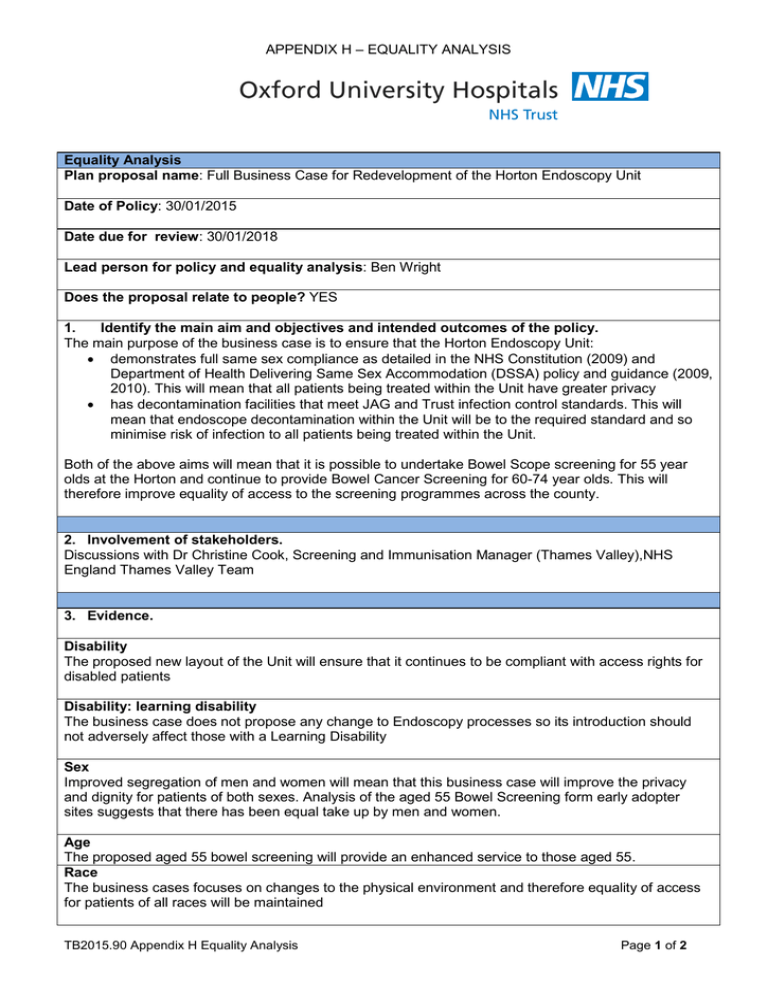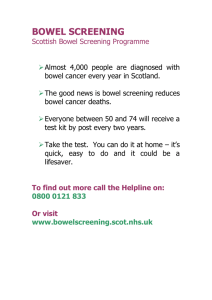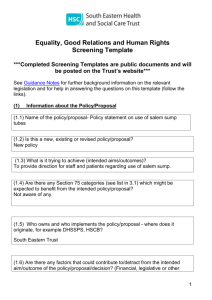
APPENDIX H – EQUALITY ANALYSIS
Equality Analysis
Plan proposal name: Full Business Case for Redevelopment of the Horton Endoscopy Unit
Date of Policy: 30/01/2015
Date due for review: 30/01/2018
Lead person for policy and equality analysis: Ben Wright
Does the proposal relate to people? YES
1.
Identify the main aim and objectives and intended outcomes of the policy.
The main purpose of the business case is to ensure that the Horton Endoscopy Unit:
• demonstrates full same sex compliance as detailed in the NHS Constitution (2009) and
Department of Health Delivering Same Sex Accommodation (DSSA) policy and guidance (2009,
2010). This will mean that all patients being treated within the Unit have greater privacy
• has decontamination facilities that meet JAG and Trust infection control standards. This will
mean that endoscope decontamination within the Unit will be to the required standard and so
minimise risk of infection to all patients being treated within the Unit.
Both of the above aims will mean that it is possible to undertake Bowel Scope screening for 55 year
olds at the Horton and continue to provide Bowel Cancer Screening for 60-74 year olds. This will
therefore improve equality of access to the screening programmes across the county.
2. Involvement of stakeholders.
Discussions with Dr Christine Cook, Screening and Immunisation Manager (Thames Valley),NHS
England Thames Valley Team
3. Evidence.
Disability
The proposed new layout of the Unit will ensure that it continues to be compliant with access rights for
disabled patients
Disability: learning disability
The business case does not propose any change to Endoscopy processes so its introduction should
not adversely affect those with a Learning Disability
Sex
Improved segregation of men and women will mean that this business case will improve the privacy
and dignity for patients of both sexes. Analysis of the aged 55 Bowel Screening form early adopter
sites suggests that there has been equal take up by men and women.
Age
The proposed aged 55 bowel screening will provide an enhanced service to those aged 55.
Race
The business cases focuses on changes to the physical environment and therefore equality of access
for patients of all races will be maintained
TB2015.90 Appendix H Equality Analysis
Page 1 of 2
Sexual orientations
The business cases focuses on changes to the physical environment and therefore equality of access
and service for patients with different sexual orientations will be maintained
Pregnancy and maternity
No anticipated impact on this group.
Religion or belief.
No anticipated impact on this group.
Gender re-assignment.
No anticipated impact on this group.
Marriage or civil partnerships:
No anticipated impact on this group.
Carers
There is no proposed change to existing Endoscopy processes. It is therefore expected that there will
be no adverse effect on carers and awareness of the needs of this group will continue to be
acknowledged by the endoscopy staff.
Safeguarding people who are vulnerable:
There is no proposed change to existing Endoscopy processes. It is therefore expected that there will
be no adverse effect on this group and awareness of the needs of this group will continue to be
acknowledged by the endoscopy staff.
Other potential impacts e.g. culture, human rights, socio economic e.g. homeless people
None anticipated.
Section 4 Summary of Analysis
There is no evidence to suggest that this business case will potentially discriminate against any groups:
the change to the physical environment will mean that men and women are better segregated which
will improve their privacy and dignity. The improvement in decontamination facilities will mean that all
patients’ risk of acquiring infection is minimised.
How does the policy advance equality of opportunity?
The proposed changes will mean the Unit can continue to provide Bowel Screening for 60-74 year olds.
It will also mean that Bowel Scope screening for 55 year olds can be commenced. This will therefore
ensure equity of access for the population in the north of the county.
How does the policy promote good relations between groups? (Promoting understanding)
The business case will neither enhance or reduce understanding between groups.
TB2015.90e Appendix H Equality Analysis
2





